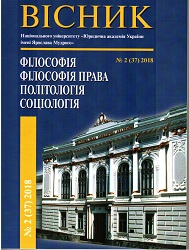«НЕГАТИВНА МОБІЛІЗАЦІЯ» НАСЕЛЕННЯ ЯК РЕЗУЛЬТАТ ІНФОРМАЦІЙНИХ ВПЛИВІВ В УМОВАХ «ГІБРИДНОЇ» ВІЙНИ
«NEGATIVE MOBILIZATION» OF THE POPULATION AS THE RESULT OF INFORMATION INFLUENCE IN THE CONDITIONS OF THE «HYBRID» WAR
Author(s): Olena Mykolaivna KindratetsSubject(s): Governance, Government/Political systems, Peace and Conflict Studies
Published by: Національний юридичний університет імені Ярослава Мудрого
Keywords: political mobilization of the population; «negative mobilization»; «hybrid» war; information warfare; information influence; destabilization;
Summary/Abstract: Problem setting. Formulation of the problem. The destabilization of the situation in the «peaceful» territory of the country in any war is beneficial to the aggressor country, but in the hybrid war it is of particular importance, since it is very important to convince the world community and its own people that the war is a civil war. The provocation of the conflict between the government and the people, between individual groups within the country takes place by means of information influence, that is, the use of special information technologies and tools that will not only affect the consciousness of people but change their behavior. The destabilization of the situation becomes possible through the «negative mobilization» of the population. Information war is now an important part of the hybrid war. It is worth paying attention to how the power of the aggressor state affects its own people, also a victim of disinformation, manipulation of consciousness. In general, the means of influence on both the people of other countries and in their own way are the same, but the purpose of the impact is different. This makes it possible to distinguish the «two fronts» of the information war. Recent research and publications analysis. The problems of political mobilization, «negative mobilization», peculiarities of manipulation of the people’s consciousness for achieving certain goals, were reflected in the scientific works of such researchers as A. Boyko, D. Goncharov, L. Gudkov, O. Meleshkina, etc. Recently, The problem of informa-tion warfare, which is a compound hybrid war. The information component of the hybrid war is explored by D. V. Dubov, A. V. Manoilo, G. G. Pocheptsov, M. P. Trebin and others. Paper objective. Based on the above, the purpose of the study is to elucidate the pos-sibility of «negative mobilization» of the population through information impacts in a hybrid war. Paper main body. There are different approaches to the definition of political mobi-lization. Many researchers believe that such a mobilization is not a manifestation of an independent identification of the desire to engage in a political process for the realization of certain interests, but such activity is prompted by politicians or political parties that have their own interests, which often do not coincide with the interests of those whom they manipulate. Therefore, the actions of the groups thus included in the political process are not rational.The concept of «negative» mobilization is used to characterize mobilized political participation. The precondition for the process of negative mobilization is the statement of the «state of the crisis», the belief that a certain boundary has been reached (or is approaching it), which can lead to irreversible changes in the people’s situation. Negative mobilization can be a consequence of state policy. and the consequence of the intervention of a third party, which is interested in destabilizing the situation and violat¬ing stability. The information war, one of the tasks of which is to resolve stability, is part of a hybrid war against Ukraine. The country the aggressor uses, using the monopoliza¬tion of the information field, forms certain stereotypes, myths, manipulates the conscious¬ness of his citizens to gain support for foreign policy. Investigating the consequences of Russia’s information war against Ukraine, it is important to find out the factors that are favorable for achieving the goal in this war. Such factors include: the lack of a single identification, the unfinished process of forming a political nation; the disintegration of society (a large gap between the poor and rich segments of the population, regions, ter¬ritories, ideological delimitation, cultural differences, the lack of consensus among the political elite even in the conditions of war.) The existing schisms in society will not be overcome until the political elite of the state itself is split. Conclusions of the research. The more unresolved problems in society, the more vul-nerable it is, the more opportunities for unfriendly states to destabilize the situation, trig¬gering conflicts in a country that is subject to aggression in the hybrid war. Success in the economy, culture, science, in the formation of a mature civil society, which controls power, forms it through elections, as well as the unity of society, are the conditions for victory in the hybrid war.
Journal: Вісник НЮУ імені Ярослава Мудрого. Серія: Філософія, філософія права, політологія, соціологія
- Issue Year: 37/2018
- Issue No: 2
- Page Range: 18-30
- Page Count: 13
- Language: Ukrainian

